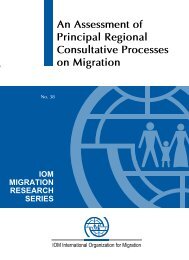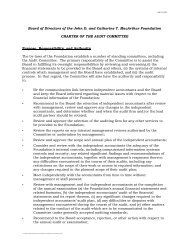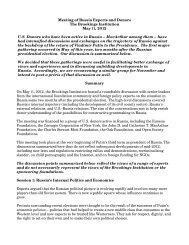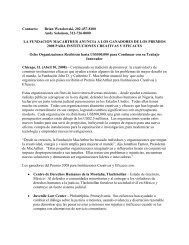A Global Compact on Learning - Brookings Institution
A Global Compact on Learning - Brookings Institution
A Global Compact on Learning - Brookings Institution
Create successful ePaper yourself
Turn your PDF publications into a flip-book with our unique Google optimized e-Paper software.
1<br />
INTRODUCTION<br />
We had to leave behind all of our possessi<strong>on</strong>s. The <strong>on</strong>ly thing we could bring with us is what<br />
we have in our heads, what we have been taught—our educati<strong>on</strong>. Educati<strong>on</strong> is the <strong>on</strong>ly thing<br />
that cannot be taken from us.<br />
—Woman who fled from Darfur to Chad, 2004 (Women’s Refugee Commissi<strong>on</strong>)<br />
Educati<strong>on</strong> Is Essential for Development<br />
The case for educati<strong>on</strong>, as expressed in the quotati<strong>on</strong><br />
above from a Sudanese woman in Breijing refugee<br />
camp in eastern Chad, is simple. First and foremost,<br />
educati<strong>on</strong> is a fundamental human right and<br />
the birthright of every child. It is also the springboard<br />
for human development, creating the c<strong>on</strong>diti<strong>on</strong>s<br />
for progress in health and gender equity 1 and<br />
it plays a key role in helping to tackle some of the<br />
world’s other pressing challenges such as climate<br />
change, food security, and peace building. Ec<strong>on</strong>omic<br />
growth and poverty reducti<strong>on</strong> depend <strong>on</strong><br />
an educated and skilled workforce. In developing<br />
countries, <strong>on</strong>e additi<strong>on</strong>al year of educati<strong>on</strong> adds<br />
about 10 percent to a pers<strong>on</strong>’s earnings. 2 For a woman<br />
farmer in Ethiopia, this can mean being able to<br />
provide adequate nutriti<strong>on</strong>, health care, and educati<strong>on</strong><br />
for her children. There are more young people<br />
<strong>on</strong> the planet than ever before with 1.3 billi<strong>on</strong> of the<br />
world’s twelve to twenty-four year olds living in developing<br />
countries. 3 Investing in their knowledge,<br />
skills, and competencies has been called the “educati<strong>on</strong><br />
growth premium” and no developing country<br />
has sustained high rates of growth without investing<br />
heavily in educating its young people. 4 Improving<br />
even the most basic educati<strong>on</strong>al outcomes can help.<br />
For example, if all children in low-income countries<br />
left school knowing how to read, something which<br />
currently does not happen, then 171 milli<strong>on</strong> people<br />
could move out of poverty. 5 There is broad agreement—and<br />
significant evidence—that educati<strong>on</strong><br />
enhances people’s ability to lead happier, healthier,<br />
and more productive lives. 6<br />
Educati<strong>on</strong> Is at a Crossroads<br />
A fundamental shift in social norms has catapulted<br />
educati<strong>on</strong>, and every child’s right to <strong>on</strong>e, into public<br />
discourse. In the mid-1900s, schools in developing<br />
countries were expected to <strong>on</strong>ly serve a small number<br />
of elites. Today, however, rarely are the merits of<br />
educating all children questi<strong>on</strong>ed; parents demand<br />
it, community leaders advocate for it, and nati<strong>on</strong>al<br />
leaders proclaim universal schooling as <strong>on</strong>e of the<br />
main mechanisms for ushering their countries into<br />
the modern era. 7 During the past decade, remarkable<br />
progress has been made in getting more children<br />
into school. There has been a surge in primary<br />
school enrollments, more children are progressing<br />
through to sec<strong>on</strong>dary school, and gender gaps are<br />
narrowing. This progress has been driven by mutual<br />
commitments, which has sometimes been referred<br />
to as a global compact <strong>on</strong> educati<strong>on</strong>, made in 2000<br />
between developing country governments and aid<br />
d<strong>on</strong>ors. The poorest countries of the world agreed to<br />
A <str<strong>on</strong>g>Global</str<strong>on</strong>g> Compa c t <strong>on</strong> <strong>Learning</strong>: Taking Acti<strong>on</strong> <strong>on</strong> Educat i o n in Developing Countries<br />
C e n t e r for Universal Educat i o n at <strong>Brookings</strong><br />
1






